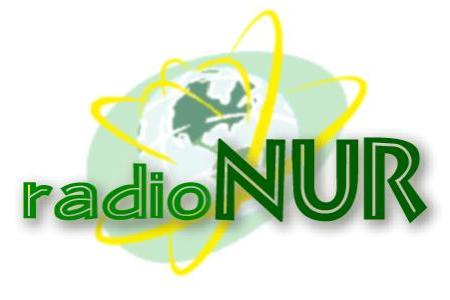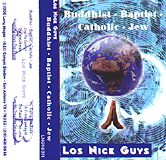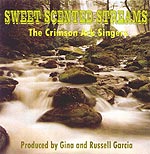BAFA © 2010. All material here is copyrighted. See conditions above. |
Michael Eissinger
radio journalism, U.S.A.
|

Logo for RadioNur, the first full-time web radio station dedicated to music by Bahá´ís. www.radionur.com has been on air since February 2002.
|
I started working in professional radio in 1979, in the San Luis Obispo area of California.
Over the next 12 years I worked as a Disc Jockey, news, program or music director or production manager at stations the coast in San Luis Obispo and Atascadero and in California's great Central Valley in Porterville, Tulare, Hanford and Fresno.
|
During most of that time I worked in what is known as AOR, or Album Rock, with the final year doing Classic Rock. I also did short stints working at Adult Contemporary and Country stations.
In 1979 while working in radio, in Fresno, I went back to school and got a degree in computers, and, for a time the two careers overlapped. Sometimes working full-time in radio while consulting, other times working full-time in computers and pulling a few weekend shifts, on-air. In 1990 I returned to Los Angeles to work at UCLA and thought I had left radio, for good.
I had become a Bahá'í in the early 70's in the small central California town of Porterville. Living there I felt very isolated from the Bahá'í world. One of the things that sustained me was the fact that I could turn on the radio, AM or FM and hear songs by Seals & Crofts, and later by England Dan and John Ford Coley, Parker McGee and Deardorff and Joseph that were either implicitly or explicitly inspired by our Faith. For a teenager in the boondocks, this helped establish a powerful connection to the rest of the Bahá'í world.
Recently, I noticed that there were more and more quality recordings being released by Bahá'í artists from around the world. Remembering the effect that music had on me when I was an almost isolated believer I started fantasizing about a world-wide satellite radio station or an internet radio station featuring Bahá'í music, news, interviews, global "community calendars", etc.
I did a quick search on the internet for automation software and found a small package out of New Zealand that was sufficient for my needs, downloaded a couple of audio utilities and began converting my collection of music from Bahá'í musicians into mp3s. I borrowed old cassettes, LP's and CD's from my mother and a couple friends, ransacked my six-year old's collection of Red Grammer CD's and managed to put together enough of a library to "start". I have been keeping a mixer and microphones in the closet for years, not know knowing why, and we still had a turntable, so I was set. I set up a small studio on my desk, put together some music rotations and "went to town".
The station, now called radioNUR, has only been on-the-air since the beginning of February 2002. Since that time, I've been constantly making changes - adding music, adjusting the music clock, adding Public Service Announcements, updating and adding to the Vocal tracks, etc.
The (computer) consulting contract that I've been working on for most of the last four years came to an end at the end of January, so I've been working on the radio station to keep busy while I've been looking for a new contract and/or a job. The station is a combination of attempting to fulfill the dream of the station and occupational therapy - it keeps me busy. The on-air programming is automated. I can program up to 7 days out, which will automatically regenerate 30 minutes before the weekends, so the station can continue, unattended, for quite some time, if needed. However, since we're still in development, I occasionally regenerate the automation playlist several times a day. The behind the scenes tasks are keeping me busy, full-time, right now.
Between transferring songs from cassette, LP, CD and download to the machine running the automation, contacting musicians and record companies, answering listener's e-mail, developing the web-site (www.radio nur.com) and planning for future aspects of the station, this is easily a full-time job. There is no difference between the amount of work required to put together a webcasting station as there is to keeping a broadcasting station going. Right now, this is an experiment.
I received a wonderfully encouraging letter, dated 7 April 2002, from the Universal House of Justice about the station indicating that I was free to pursue the enterprise as a commercial or a non-profit entity and that no institutional sponsorship was needed for the project. Additionally, the Supreme Institution suggested that I surround myself with competent collaborators to assist with the technical, managerial and funding aspects of the endeavour. I have been putting together such a team and we're in the final stages of forming two companies. The first company, radioNUR, Inc., is tasked with the commercial operation of the station along with any possible side broadcasts as well as looking to the future toward short-wave broadcasts and satellite uploads.
The second entity, a non-profit corporation, will be tasked with providing training and resources to small radio start-ups in developing areas, the development of programming to support the Institute Process, devotional gatherings, children's enrichment and education and general deepening and training. We have received a small amount of seed money with which to start and are seeking additional funding in the nature of loans to the commercial station and donations to the non-profit. The two companies will work together, however, the management and financial sides of the two companies will be maintained separately.
The goal is to forge ahead. During the first week in May we shut down our existing ShoutCast server and signed a contract with WarpRadio to rebroadcast and distribute the station. This allows us to provide unlimited concurrent connections, regardless of the user's connection speed. It also simplifies connection for Windows users, as there's no longer a need to download and/or install any additional software (Mac users and those using other OS's may have to take additional steps to listen, for the timebeing).
An additional expense we've been looking forward to is the royalty issue. We're in the process of registering with ASCAP and BMI and will be paying standard royalty rates, which is a normal cost of doing business. The new rates that have generated so much press, lately, here in the States, pertain to "interactive" content and only to those songs released by labels covered by the agreements. As radioNUR provides no interactive material and the majority of the material was either self-released or distributed by small independent labels or through Publishing Trusts, these royalties should have minimal impact. About the only material that might be subject to royalty payments is the stuff from the 70's that was released via mainline, big-name labels. The worst thing that might happen is that we'll have to pull some of the old Seals & Crofts or Walter Heath recordings from the library. If the rates don't end up too high we'll simply leave them in the library and make the payments.
|

Music cassette, Buddhist-
Baptist-Catholic-Jew
by Los Nice Guys, U.S.A.
 Sweet Scented Streams
Sweet Scented Streams
19 songs based on the Bahá´í Writings by various authors,
sung by The Crimson Ark Singers.
Produced by Gina and Russ Garcia
 
Music CD,
Here at Black Mesa Arizona
Lunar Drive
list of tracks
Vocals: John B. Benally, Sandy Hoover, Sam Minkler, Kevin Locke, Rey Cantil, Henrik Takkenberg.
Produced by Sandy Hoover, Count Dubulah and Dave White.
 
Music CD,
El Momento, 2000, by the Chilean band, Arka
Vocals: Javier Duhart, Daniel Duhart, Ma Sol Bonilla.
Produced by Slavian Kúzmanic and Arka.
Justice Leeg
Traveling_Men, 2002

ReyLoo
Robert "Earliodine" Sinclair
Mathai Mathenge a.k.a. Soloman Coal
Benny Casablanca
JbiRd
Lyrics: Rey Loo, Benny Hoof, Mathai, JBiRd & Earliodine with the "Hidden Word" by Bahá'u'lláh

Music CD, Love Setteth
the World Aflame
by Roya Bauman, U.S.A.
|
Very shortly we will begin soliciting commercial clients. We have at least one experienced media salesperson coming on-board. I believe that the station will become financially viable, if done properly. We have worked out advertising rates and plans (which we believe are reasonable) and believe we provide a unique service, being in the position to provide world-wide advertising for products and services to the Bahá'í community.
Some of the artists I've contacted via their websites. Others I've located their music through recommendations from other people. Some I found via the Arts Dialogue website. There's some really great new music out there. Even though I'm from the Seals & Crofts generation, I'm thrilled that there are so many new artists who aren't just trying to sound like more of the same.
I'm making the same assumption any on-air radio station makes -- if the artist has released a recording, he/she is implicitly giving permission to air the product. If any Bahá'í artist doesn't want their music played, I will comply with their request, however, I would hope that they would want to share it with as large an audience, as possible. Many artists such as Doug Shaffer, Steven King, Trudy Diening, Russ and Gina Garcia, Los Nice Guys (Larry MaGee) -I'm sure I've left some out- have sent me CD's and/or cassettes. Others, such as Lunar Drive, Vicki & David (a U.S. vocal duo) and Arka have either uploaded or e-mailed me tracks. Don Reed has even provided me with a few unreleased tracks, which are exclusive to our station.
I come from music-based radio. I'm also a (now former) musician. (I studied music in high school and college, playing brass, keyboards, and singing, and wrote and recorded some songs with Steven King, in 1980.) I know the power of music. Bahá'u'lláh calls music "the ladder of the soul", which is the same phrase from the Koran which is used to describe prayer. I believe that music is probably THE most powerful way to deliver "the message".
One of my main motives, for only airing music by Bahá'ís is that in many ways, the station is programmed, primarily, for Bahá'ís. Non-Bahá'ís will learn about the Faith through the spirit infused in the music by the artists, but, the goal is to give the Bahá'ís a home where they can go and get refreshed, strengthened and reconnected. Look at all the contemporary Christian stations that have sprung up, over the last decade (at least here, in the US). They're making money, but, they're also helping individual Christians function, day-to-day, through the support and reinforcement that comes from their choice in "entertainment".
Because I felt that we needed to have some direct mention of the Bahá'í Teachings I made arrangements to air the "Bahá'í Perspectives' radio program by Dean Martineau. These are rebroadcasts of past shows which were originally aired on the American Council of the Blind's webcast station ACBRADIO. Each program covers a specific aspect of the Faith, some are about the life of Bahá'u'lláh, others are about the Bahá'í concept of Peace, or examine the teachings on race unity.
Currently, there are about 30 shows, so we run each show, repeated four times every Sunday. This is all part of the initial phase of testing how to make a 'global' Bahá'í web radio. We're also airing a short Spanish-language program, "el Divino Arte de Vivir" on Sundays and will shortly begin airing some wonderful children's programming.
Some of this programming will continue on the station, some may be replaced or augmented, in the future with new programs developed by the staff or via the non-profit organization.
I am well aware of the passion that people have for "their" music. When listeners would call in my days as a radio DJ to talk about specific songs or artists they felt there was a connection, not only to the individual song but a personal connection to the artist. Sometimes that connection extended to his or her "message". One of the biggest problems that has crept into radio in the States over the last decade or so is the unwillingness to take chances.
Stations are programmed to not offend, rather than excite. That's why stations have become so narrowly formatted and focused - most stations play only 300-750 songs, which means that, at the most, they have played every song they own within two and a half days. The goal at WebCast9 is to have thousands of songs from around the world, in a range of styles. It's important to realize that what is exciting to someone may be a turn-off to someone else. Therefore, a young urban youth may be turned off by a choral or operatic piece, but, deeply moved and spiritually uplifted by a rap or techno track.
I try to make no value judgement on the appropriateness of the presentation, based upon format or style, which is why you'll year the Sydney choir in the same hour as Justice Leeg (hip hop), Los Nice Guys (country-folk) back-to-back with Walter Heath (R&B) or Roya Bauman (acappella). My hope is that everyone will be able to listen to the station, be comfortable with music from those styles they're familiar with and expand their horizons to other forms of musical expression with which they may not already be familiar.
What I love about the groups Lunar Drive, Arka, Aube Mystique, Alex
Zografov and some of the other, younger artists like Justice Leeg is that they're taking bold steps. They're not trying to sound like Seals & Crofts, they're not doing "folk". They're
stretching the envelope of "Bahá'í Music" as much as Jim and Dash did, 30 years ago
(I can't believe it's been that long). We're very liberal with our selection standards. After being on the air for just two months we now play music from over 190 different artists and the goal is to just continue to add to the list. Sitting in the studio, right now are LP's and cassettes from an additional 11 artists which will be added over the next few days. We get an average of 5 new CD's every week from around the world and now play artists as diverse as Point Five, Amaryllis, Trudy Diening, Los Nice Guys, Arka, Beloved, Dario Cardoso, Korma, Syntax, Lunar Drive, Plains of Fascination, Alex Zografov, Anna Hostman, Jamie Findley, Michael Wells and the Unity Band. I spent over a decade in album rock where the goal was depth, not repetition. The goal here is to expose thousands of musicians to the Bahá'ís of the world, we're not into making "hits" we're into supporting a diverse musical community and helping the individual strengthen his/her Bahá'í identity via the arts.
Arts Dialogue, June 2002, pages 15 to 18.
Email: eissinger@radionur.com
Log-in to RadioNUR at: www.radionur.com for music, for information about musicians with links to their websites, and other information.
Check out
The best of RadioNUR CD compilations.
This page has sound clips of all the artists on the CDs.
|

Arts Dialogue, Dintel 20, NL 7333 MC, Apeldoorn, The Netherlands
email: bafa@bahai-library.com
|
|


 Sweet Scented Streams
Sweet Scented Streams



